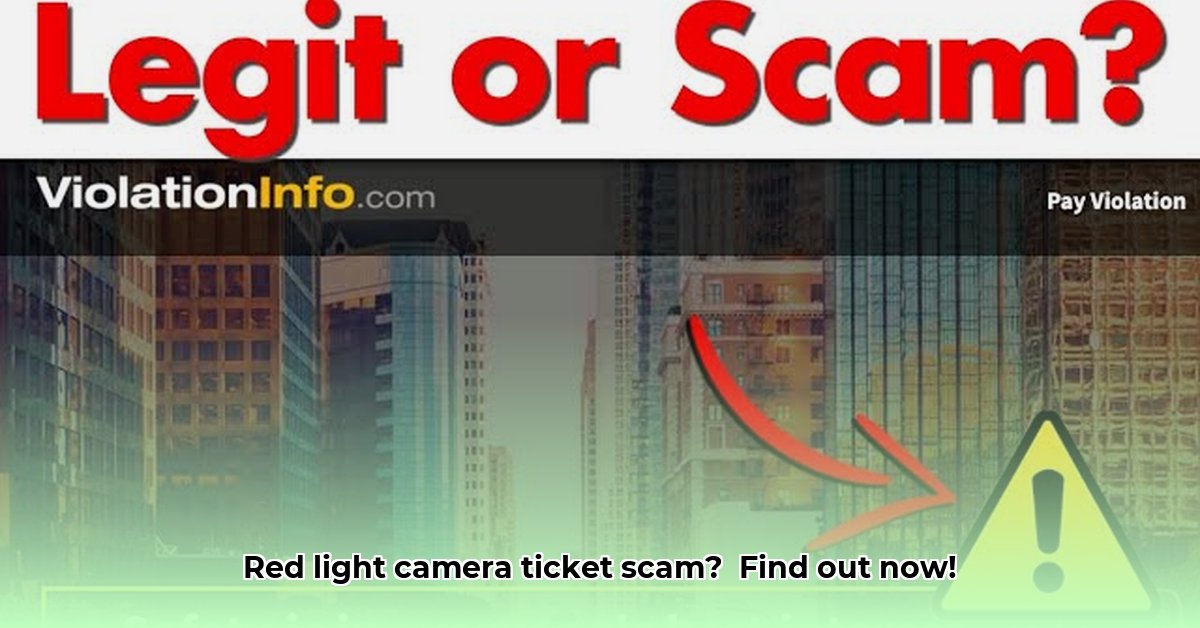
Is violationinfo.com Legit? Decoding the Red Light Camera Ticket Scam
Fake red light camera tickets are surging, leaving drivers stressed and financially vulnerable. These scams, often employing official-looking documents and threatening penalties, trick victims into paying phony fines. This guide empowers you to identify and avoid these scams, protecting your wallet and peace of mind.
Spotting a Fake: It's All in the Details
While convincingly realistic, fake tickets have telltale flaws. A careful examination will reveal their fraudulent nature.
Missing VIN: A legitimate ticket always includes your vehicle's identification number (VIN). Its absence is a major red flag.
Suspicious Citation Number: Official citations use unique, verifiable numbers. An unusual or unverifiable number is a warning sign.
Unusual Payment Methods: Legitimate agencies typically offer secure online portals or mail-in options. Requests for payment via prepaid debit cards, wire transfers, or obscure methods strongly suggest a scam.
Vague Language: Real tickets are specific. Unclear wording or generic terms (e.g., "owner of a vehicle") indicate a fake.
Threat of Immediate Suspension: Legitimate agencies follow legal procedures. Threats of immediate license suspension aim to create panic.
Inconsistent Fine Amount: Does the fine seem unusually high or low for the alleged violation in your area? Verify typical fines online for your location.
What to Do If You Think You've Been Targeted: A Step-by-Step Guide
Do Not Pay: Paying validates the scam and encourages further fraudulent activity.
Document Everything: Take clear photos or scans of the entire ticket, including any suspicious details.
Contact Your DMV Immediately: Verify the ticket's authenticity through your state's Department of Motor Vehicles (DMV) website or phone line.
Report It to the Police: File a police report to aid in tracking and stopping the scam.
Verify Online: Use your local jurisdiction's official website to check for legitimate tickets. Never rely on links within a suspicious document.
Resources for Confirmation
Your State's DMV Website: Verify traffic violations online.
Your Local Police Department's Website: Many departments provide resources for reporting scams.
Official Government Websites (.gov): Always source information from official government websites.
Understanding the Risks: A Risk Assessment Matrix
A quick overview of common scammer tactics and their potential impact:
| Scam Tactic | Probability | Impact | Mitigation |
|---|---|---|---|
| Realistic-Looking Fake Tickets | High | High (Financial Loss, Stress) | Meticulous examination of ticket details |
| Exploiting Lack of Awareness | High | High (Financial Loss, Stress) | Stay informed; understand your rights |
| Vague Wording & Details | High | Moderate (Confusion, Delay) | Look for specific vehicle information |
| Geographic Targeting | Medium | Moderate (Targeted Scams) | Report suspicious activity; heightened awareness |
How to Spot a Fake Red Light Camera Ticket Scam
Key Takeaways:
- Fake tickets are sophisticated and increasingly common.
- Scammers aim to steal money and personal information.
- Careful examination and verification prevent victimization.
- Reporting protects others from similar scams.
Identifying a Fake Ticket: A Detailed Checklist
Visual Inspection: Compare the ticket to genuine examples online. Note any inconsistencies in fonts, logos, design, print quality, and image resolution. Blurry or manipulated images are common in fakes.
Verify Details: Ensure the VIN and citation number are correct and verifiable through official channels. Check the court address's legitimacy.
Scrutinize Payment Methods: Legitimate tickets usually use established online portals or mail-in options. Beware of unusual methods like prepaid cards or wire transfers.
Beware of Urgency Tactics: Genuine notices don't usually threaten immediate suspension or demand immediate payment.
Actionable Steps if You Suspect a Scam
- Refrain from Payment: Paying confirms the address and potentially escalates the scam.
- Comprehensive Documentation: Photograph or scan the ticket, retaining records of all communication.
- Report the Incident: Contact your local police and DMV immediately. This will help investigations and prevent others from being victimized.